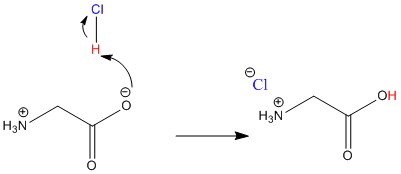I cannot figure out why glycine hydrochloride is more acidic than chloroacetic acid. Could I have figured this out from a $\mathrm pK_\mathrm a$ table and maybe am just not seeing it? On the table I have in my book (Organic Chemistry, Seyhan Ege, 3rd edition), neither acid nor its conjugate base are there.
2 Answers
Glycine hydrochloride is the amino acid glycine adsorving a molecule of Hydrochloric acid, wich is a strong acid. I think this is the main reason of the acidicity difference, since the pKa's are similar (comparing glycine and chloroacetic acid).
Update: glycine is amphoteric: it can either act as a base or an acid. In water the hydrochloric acid molecule of the glycine hydrochloride will dissociate: $$\ce{H2O +HCl -> H3O+ +Cl-}$$ Then: $$\ce{Gly +H+ -> GlyH+}$$ $$\ce{GlyH+ +Cl- <-> Gly + H+ + Cl-}$$ You can conclude, therefore, that Glycine hydrochloride is more acid than glycine (and also the chloroacetic acid). Hope it helps, and sorry for the english mistakes!
Glycine hydrochloride is a salt of the amino acid glycine. This means that HCl (hydrochloric acid) has been used to protonate the molecule.
To understand better which part of the molecule is protonated we need to think about chemical structure of glycine and it's acidity in water.

In water glycine is amphoteric which means that it can react acid as well as base. The hydrochloride salt can be easily prepared by adding HCl to solution.

Now if we evaporate solvent we will get glycine hydrochloride salt, which has a pKa is 2.3 for first deprotonation and a pKa of 9.6 for the second deprotonation. Chloroacetic acid's pKa is 2.87, which means that glycine hydrochloride is more acidic.
Why? It's conjugate base is more stable.
In common language conjugate base is happy with its charge and doesn't want to get protonated. Let's take look at conjugate bases.

In chloroacetic acid's conjugate base, the nearby electron withdrawing chlorine group stabilizes the negative charge in the conjugate base, which lowers the pKa of chloroacetic acid compared to acetic acid (pKa = 4.75) ~ 2 units (remember pKa is on a logarithmic scale). In glycine hydrochloride's conjugate base, the nearby positive charge stabilizes the negative charge of conjugate base, which lowers the pKa even more to 2.3.
